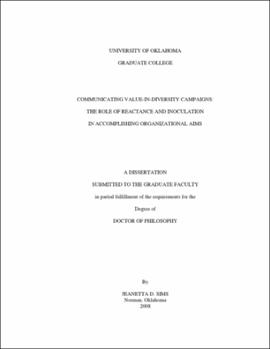| dc.description.abstract | This investigation seeks to illuminate important considerations for carrying out value-in-diversity campaigns with the eventual aim of helping organizational messages be more persuasive, more influential, and less likely to generate reactance. Using Brehm's (1966; Brehm & Brehm, 1981) psychological reactance, it is predicted that value-in-diversity campaign messages provoke reactance among majority members of an organization. The magnitude of reactance, the impact of reactance upon attitudes, and the impact of reactance upon attraction of the restricted freedoms is explored as well as implicit/explicit message strategies and the restoration of freedoms. In addition, using McGuire's (1961, 1962, 1964, 1970) inoculation theory, this research investigates avenues for protecting value-in-diversity attitudes from slippage once organizational diversity initiatives are underway. Also, this investigation offers schemas as an alternative mechanism for the way in which inoculation promotes resistance. In the areas of psychological reactance, results indicated that value-in-diversity campaign messages do generate some symptoms of reactance (greater threat to freedom and more anger-related negative affect) with all manifestations of reactance (greater threat to freedom, more anger-related negative affect, more negative source evaluations and less favorable attitudes) being experienced by majority organizational members as compared to minority members. Campaign messages with explicit language elicit greater threat to freedom with no negative attitudinal implications, while campaign messages with a restoration postscript reduce threat to freedom. For inoculation, results failed to support an overall inoculation effect, but instead indicate a more nuanced path to resistance within the organizational diversity context. Minority members experienced greater threat to susceptibility of their pro-diversity attitudes, and inoculation posed as a viable strategy for conferring attitudinal resistance to attack among organizational members with higher involvement levels. No support for the predictions related to schemas was found in this investigation. | |
